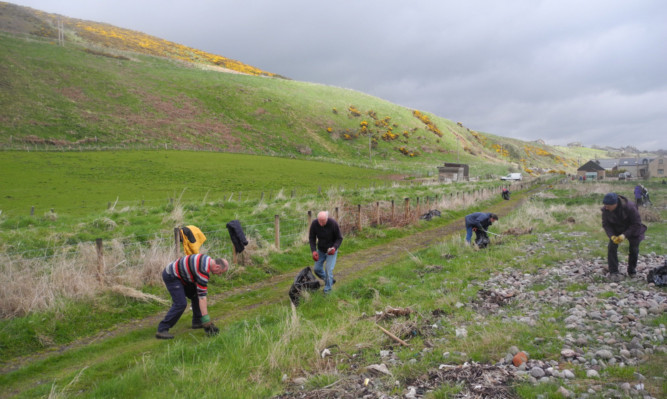A Mearns beauty spot is being spoiled by sanitary waste, sewage and sea litter, according to a local campaigner.
Fergus Napier, who is the secretary/treasurer of Gourdon Grafters, took up the issue with the Scottish Environment Protection Agency (Sepa) following concerns raised during a beach clean-up at Gourdon.
The Gourdon Grafters are a small group of residents dedicated to improving the visual aspect and setting of the village.
Mr Napier is also concerned about combined sewage outfalls (CSOs) which collects sanitary sewage and stormwater run-off in a single pipe system.
There is one in Gourdon which has led to a large amount of sanitary products ending up on the foreshore and subsequently being picked up during beach cleans.
Mr Napier said the clean-up had also uncovered oilfield boot covers, shrink wrap, gloves and commercial fishing gear washed up on the beach.
He said: “The sanitary waste would suggest to me that somewhere within the vicinity of Gourdon the sewage outfall into the sea is not filtering out the man-made waste from the human waste.
“Having involvement with the marine and offshore industry it is very unlikely that such waste in such quantities is coming from ships or rigs.
“I am also unhappy about the pollution from CSO and waste from offshore installations, shipping and the commercial fishing industries contaminating our beaches and coastlines.
“There are strict controls on garbage disposal from ships and waste disposal policies on offshore installations so how is this stuff falling overboard?
“Commercial fishing waste is slightly different as they lose a lot of gear in storms but again they also have to be contributing to the garbage washing up on the beaches.
“Perhaps there is a lack of awareness by the general public, offshore personnel and fishermen on the impact of these sorts of materials on our beaches.”
A Sepa spokeswoman confirmed that there is a ‘combined sewage outfall’ or CSO in the area where the Gourdon Grafters conducted the beach clean.
She said: “I expect that the sanitary products that you collected were quite likely sourced from the CSO.
“Combined sewers carry business and domestic wastewater and rainfall in the same pipes to a local wastewater treatment works for treatment prior to discharge.
“The heavier the rain, the greater the flow the sewer has to carry. It is inevitable in heavy rainfall or equivalent weather events that some of these sewers will be overwhelmed.
“The overloading, if not relieved by CSOs, would lead to storm sewage flooding homes, gardens, streets, roads and open spaces.”
She said CSOs are therefore a design necessity in combined sewer systems to ensure that any excess flow takes place in a controlled way and at specified and managed locations.
“Scottish Water are raising awareness with the ‘bag it and bin it, don’t flush it’ campaign in an attempt to inform the public what can and cannot be put down the toilet. Sepa do however continue to monitor and regulate CSOs to ensure that they only discharge during the defined conditions and that any mechanical failures are dealt with immediately.”
